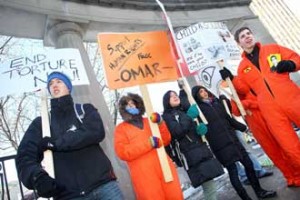
Student groups raise awareness of human rights issues
By Pascal Zamprelli
Tuesday, Jan. 27, was a cold day for a demonstration at the Roddick Gates. But an intrepid group of students, fuelled by the justness of their cause, was undeterred.
The goal was to raise awareness of the plight of Omar Khadr, the lone Western citizen still incarcerated at the U.S.’ widely criticized Guantanamo Bay Naval Base in Cuba. This was part of Five Days for Human Dignity, a week-long series of events organized by the student group Amnesty McGill, with the help of the McGill Armenian Students Association, the Armen Karo Students Association, the Burma Solidarity Collective, the Spanish and Latin American Student Association, and Solidarity for Palestinian Human Rights.
“One of the reasons we decided to create Human Dignity Week is that when we’re studying we focus a lot on statistics and the big issues, and it can become very general,” said International Development Studies student Margoth Rico, Co-director of Amnesty McGill. “Focusing for example on a case such as Omar Khadr reminds us that every individual is important.”
“Especially because Khadr is Canadian,” added Co-director Silvana Lovera, who is studying international development. “And he was a child when he was taken to Guantanamo. I think a lot of people forget that, and a lot of people don’t even know that.”
Such a lack of awareness was one of the driving forces behind Human Dignity Week. Building on Amnesty McGill’s successful film festival last year, the organizers clung in part to the movie idea – screening films dealing with genocide, domestic violence, and Burma. But they also decided to make their event both more visible by handing out information on campus, and more diverse with a round-table on genocide and the Khadr demonstration.
They also called upon some of McGill faculty expertise, in the form of lectures by McGill professors working on human rights issues, such as Payam Akhavan and Adelle Blackett of the law faculty, who spoke respectively about territorial integrity and the rights of domestic workers.
“We have access to all these amazing professors working on these issues,” Lovera said. “We have access to so much information and so many people. Now is the time to really learn and get as much as we can, and try to find our own way of helping.”
Rico echoed the statement, urging students to realize that “the more you get involved, the more you go to these types of events on campus, the more you will get out of McGill. And the younger you start, the better it is. You make your own education, so it’s up to you to decide how much you’re getting
from it.”
For Lovera, this type of involvement gives students both the opportunity to learn and to inform. “It’s about the learning process, and it’s a way of teaching others. We are an educated group of people here at McGill, and we should know what’s going on in the world, especially because we have the ability to make change.”
